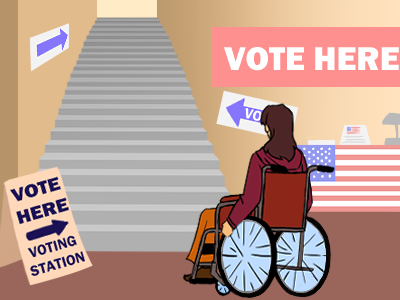Disabled Texans affected by voting restrictions

Illustration by April Calvo/The Et Cetera
March 8, 2022
Manuela Lazcano is an elderly paraplegic who emphasizes the importance of voting. Whether it is local or national, she tries to participate in every election.
Although Lazcano successfully voted in person for the 2022 Texas primaries, she expressed frustration toward Senate Bill 1’s rollback of voting options.
“People are getting upset about [SB 1] and saying, ‘No, I’m not going to vote “[Voting] is important. If we can’t do anything, nothing is going to get done for us.”
Senate Bill 1, which went into effect Dec. 2, 2021, was the result of a Republican-backed effort to prevent election fraud. Lazcano was one of many voters who switched to in-person voting after the bill prohibited drive-thru and 24-hour voting and placed limits on mail-in voting.
“[Republicans] are denying us the right to vote,” Lazcano said.
[READ MORE: Voting numbers shift under new restrictions]
Texas is one of eight states that doesn’t allow online voter registration, requiring voters to fill out physical applications, especially if they wish to cast absentee or mail-in ballots.
However, according to The New York Times, 30% of mail-in ballots cast in during early voting in Texas were rejected.
During the 2020 election, the rejection rate stood at less than 1% statewide.
“I voted against [SB 1] because it disproportionately targeted people of color, disabled people and senior citizens,” Texas Rep. Victoria Neave Criado said. “I believe we need to make voting easier for our community.”
Neave Criado participated in a walkout to protest SB 1 during a special legislative session in July 2021.
“These voting laws are being challenged right now by the Department of Justice,” Neave Criado said.
Meanwhile, Wanda Williams, a social work major at Eastfield, said she doesn’t mind the hurdles.
Although being immunocompromised limits Williams to going out in public only for important matters, she said she wouldn’t want to vote by mail.
“I vote in person because l like to see my own ballot,” Williams said. “I would like to see [the voting process] for myself.”
Williams expressed satisfaction with the voting process and said she didn’t have any problems casting her ballot.
“Everywhere I go, the [election officials] are friendly,” Williams said. “They’ll help you with the machines and whatever. They help [people] a lot, especially the elderly.”
[READ MORE: Abbott and O’Rourke take the primaries]
Williams experience is different than many of Lazcano’s friends.
Lazcano said her social circle consists of elderly individuals who require additional help from family members and friends to vote. A friend of Lazcano, Michelle, who died shortly after SB 1 passed, fell into this category.
“Even though she was blind…I helped her walk to the polling place,” Lazcano said. “I would assist her, and she cast her vote no matter what.”
Michelle took advantage of alternative voting methods when her health deteriorated.
However, this changed when SB 1 limited how much non-election officials could assist disabled voters, including limiting direct ballot assistance.
“For her last years, we did [drive-thru voting],” Lazcano said. “And she was so mad and upset when they passed [SB 1].”
The election overhaul gave Lazcano a reason to vote for Texas Democrats, who have directly challenged SB 1 since its conception.
Lazcano advises voters to vote for politicians who keep people like her in mind.
“Texans need to get out and vote,” Lazcano said.



